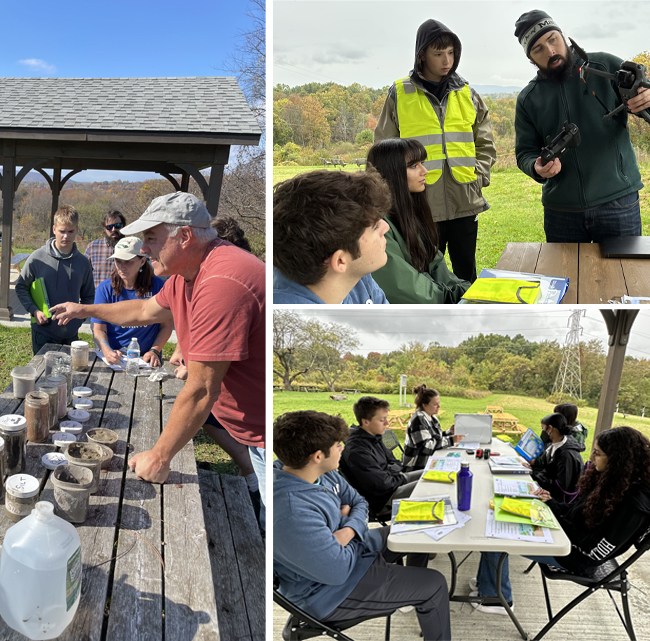All about Septic Systems
Your Septic System – What you need to know.
Maintaining your Septic System
How to conserve water in your home and yard.
Your Septic System – What to know when you are buying or selling a home.
Your Septic System – What to know when building or remodeling your home.
The 2024 Dutchess County Annual CAC & EMC Roundtable
Image
Young Engineers Empowerment Program
The Dutchess County EMC is partnering with HVEA Engineers and Peach Hill Park to run the pilot program of the Young Engineers Empowerment Program, where high school students learn valuable STEM skills while they design and build a new rain garden for stormwater management at Peach Hill Park.
Day 1 – Students learned how to fly drones, create topographic maps & to delineate watersheds.
Day 2 – Students created watershed models & learned how water flows.
Day 3 – Students learned about soil types and other geotechnical concepts from HVEA’s geotechnical engineer in preparation for exploratory subsurface investigations for their rain garden design. Students performed percolation tests and determined what kind of underlying soils were present and what infiltration rates to expect to detail their design further.
Day 4 – Students learned about landscape architecture from a Licensed Landscape Architect and choosing native plantings with optimal pollutant removal benefits for the rain garden design.
Day 5 – Students learned about protecting various resources during construction & finalized their rain garden designs. Students developed an “engineer’s estimate” of materials they will need for construction in the Spring.
There will be 5 more sessions in the spring. In April, the students will work on the construction of the rain garden and learn valuable skills through our construction management program.
HVEA Engineers: https://hveapc.com/
Peach Hill Park: https://peachhillpark.org/

Great Opportunity to Build STEM Skills
Image
Composting in Dutchess County
Most of us at some point in our lives have been to a municipal dump. They are mostly pretty disgusting. All that trash we humans create goes somewhere – usually a landfill or waste-to-energy facility. Some of us leave those facilities thinking we’d like to do something to reduce what we send to the dump. Well, there is something we all can do. We can compost our kitchen scraps. Food scraps make up the largest proportion of the material we discard. If we all composted, we would significantly reduce what goes to our waste facilities.
Starting a compost is easy. You can compost your kitchen scraps if you live out in the country or in an apartment in the city. There are plenty of options to choose from. You’ll help reduce the volume of material going to our landfills and waste-to-energy plants, and you’ll end up with beautiful soil. Whether you want to drop off your compost at a nearby facility, set up a compost in your yard or even in your own kitchen, there’s an option for you.
Check out these resources:
Dutchess County Solid Waste Management
Cornell Cooperative Extension Dutchess County
Composting: An Ecological Perspective
Join Cary ecologist Dr. Jane Lucas for a virtual science talk on the biology and ecology of composting. The presentation will include a demonstration on how you can start composting at home. Lecture is available on YouTube
Road Salt – Climate Smart Rhinebeck
What is salt brine? Salt brine is a solution of salt (sodium chloride, or NaCl) and water. It has a much lower freezing point than freshwater, and is a useful tool in reducing the adhesion of snow and ice to road surfaces. While some brine cocktails are exclusively saltwater, some include calcium chloride or magnesium chloride. See link for more detail.
Plastic-Free Back to School Guide

- Invest in Reusable Foodware For Plastic-Free, Zero-Waste Snacks and Lunches
- Buy In Bulk, Bring Your Own Containers and Shop Local
- Check Your Office, Shelves, Desk, and Closet for School Supplies Before You Buy
- Get New (To You) Clothes By Buying Secondhand
- Use This As An Opportunity To Educate Your Child
For detail information on each of the Tips follow the link to Beyond Plastics
Use Less-Toxic Products

We put ourselves, our families, and our pets at risk when we use herbicides, pesticides, highly corrosive products like drain cleaners, and toxins like ammonia and bleach. Sewage treatment plants don’t eliminate these chemicals, and many find their way into our air, water and ecosystems.
Fortunately, there are safer alternatives that work just as well. By choosing a non-toxic option or the least toxic product, you can protect yourself and the environment. Click on the following link for more information, DEC
Submitted by Candice Merrill


